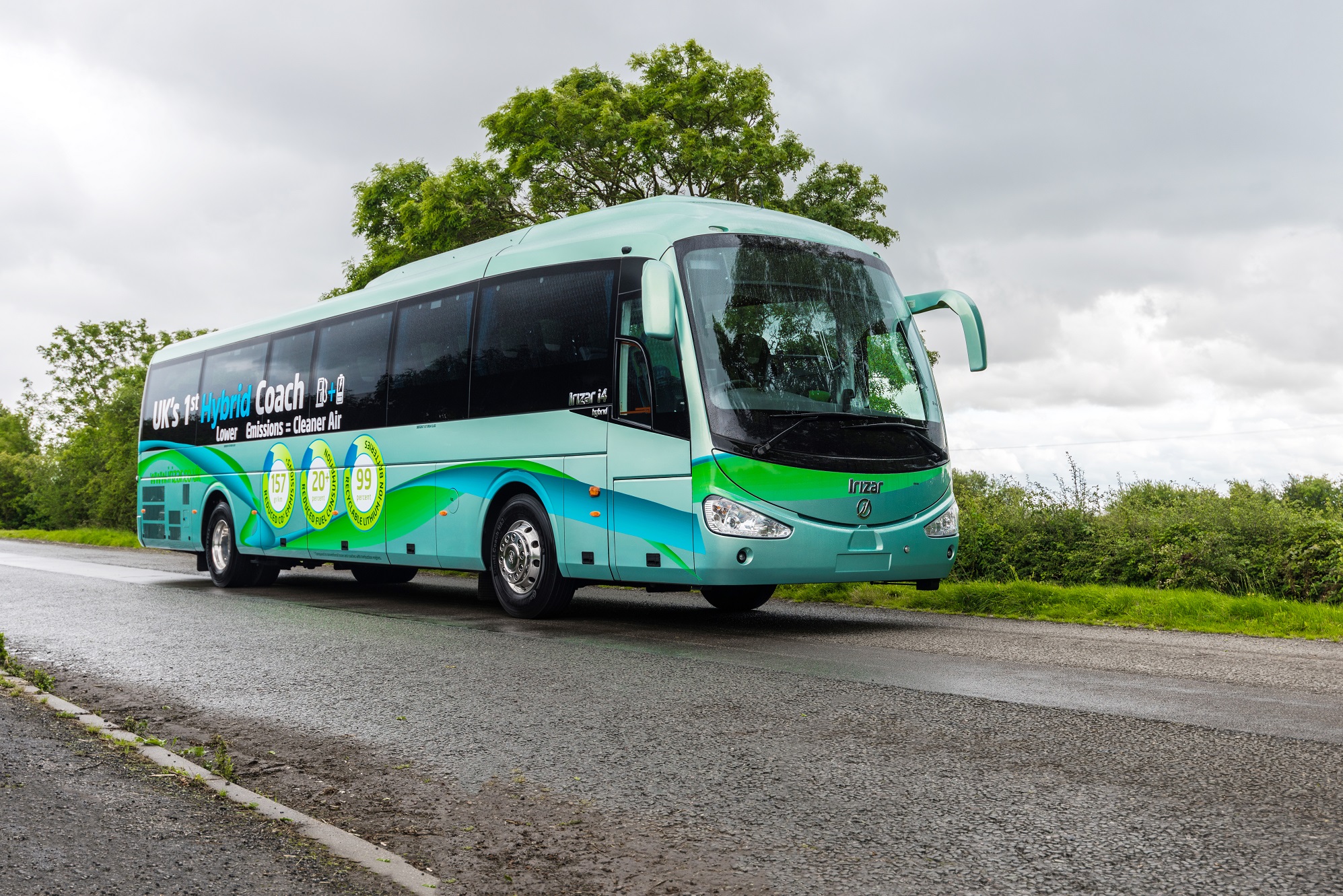A bright spot for the coach industry has been presented by the Low Carbon Vehicle Partnership (LowCVP). It is working with stakeholders to establish Low Emission Coach (LEC) and Ultra Low Emission Coach (ULEC) schemes. Each has the potential to offer grant funding towards new vehicles.
Should LowCVP’s proposals be accepted by government, operators would be eligible for grants that cover a percentage of the cost differential between a standard coach and a certified LEC or ULEC. Grants could also go towards infrastructure costs, where applicable.
Work to formally define both an LEC and a ULEC is still to be undertaken. If completed, each definition will stipulate a minimum reduction over a baseline of well-to-wheel greenhouse gas emissions. It is likely, but not confirmed, that those figures would be 15% and 30% respectively.
To validate a coach model’s status as a LEC or a ULEC would involve it being tested at Millbrook Proving Ground. A suitable testing procedure is already in place thanks to the coach Euro VI retrofit accreditation process.
Diesel, diesel-electric hybrid and zero-emission coaches would all be eligible for submission and certification as a LEC or a ULEC. Thus far only buses with the latter two drivetrains are part of the Ultra Low Emission Bus programme.
From the point of view of leveraging government support, validation is an important first step, says LowCVP Project Manager Dan Hayes. Doing so scientifically will reassure politicians that any money that is provided will be used as intended.
“They know that they are not funding random things that do not work. Through formal validation and subsequent certification, concrete proof exists that the vehicle concerned emits lower quantities of well-to-wheel greenhouse gases.”
Coach grant funding benefits are obvious, says LowCVP
Whether funding from the proposed LEC and ULEC project would be awarded via a competitive bid process or through an ongoing per-vehicle voucher-type grant that can be accessed by all is yet to be decided.
“It may be better for the first round to be competitive. That would allow us to see what level of interest there is,” says Dan. The award mechanism could later change to a voucher method. But with the latter comes a difficulty. Awarding a grant towards infrastructure, such as that required by battery-electric coaches, is awkward through a voucher scheme.
“In a competition, a bidder could say that ultimately it wants to electrify 20 coaches. At the point of submission, it may not be able to afford them all. But it might be beneficial to install the infrastructure for all 20 at that point.” That can be accommodated relatively easily via a competitive scheme. It is tricky to do so through a per-vehicle approach.
“When it comes to electrification. the infrastructure cost varies depending on the depot location. But that is not to say that there could not be a voucher-based approach in the future.”
There would likely still be an element of the increased purchase price of an LEC or a ULEC to be paid up by the operator, even when a grant is factored in. But that would be more than mitigated in the longer term by the vehicle’s lower energy costs.
Will PSVAR figure as part of the LEC and ULEC project?
The likely funding draw for the LEC and ULEC project is small in terms of the overall budget of the Department for Transport (DfT). As such, promoting the development and purchase of such coaches could represent a relatively easy win for government.
Grants may not come without strings, however. Ongoing difficulties with PSVAR in the coach market are well known. LowCVP has mused whether a condition of LEC and ULEC grants could be that they are only payable against coaches that comply with accessibility regulations.
If agreed, that stipulation would act as a major boost to the government’s otherwise faltering hopes of seeing a larger pool of PSVAR compliant coaches.
“I believe that DfT would require PSVAR compliance for LEC and ULEC money to be paid,” says Dan. “It wants to see more compliant coaches in the market. PSVAR is out of our remit but agreeing to mandate it as part of the project would be a help in having it accepted.”
LowCVP already working with manufacturers to advance plans
LowCVP has already engaged with some coach OEMs about its LEC and ULEC proposals. The pace of that discourse has slowed since the onset of coronavirus COVID-19, but several manufacturers have shown interest in the project.
With the current good availability of Millbrook testing slots, Dan says that formal LEC and ULEC definitions could be delivered in time for the 2021/22 financial year. They could be here even sooner if government commitment is received quickly.
An option for manufacturers to speed introduction of the LEC and ULEC project is to contribute to funding the definition process themselves.
That body of work could be presented to DfT. It would then be called upon to make money available. Unlocking grant funding may not be as difficult as would be thought, says Dan.
Early industry appetite for LEC and ULEC project present already
An appetite among buyers for the project already exists. Several operators, including some within the family-owned sphere, have expressed an interest in purchasing LECs and ULECs.
“They recognise that while coaches are already a low-carbon mode of transport, the sector must still be part of the solution to air quality challenges and Net Zero obligations. There is an interest in the plans.”
Lenders are also keen to back low-carbon developments, he continues. As an example, in the bus sector Zenobe has brought to market a sizeable pot of money for electrification projects. It is not inconceivable that a similar approach from other suppliers could assist LEC and ULEC purchases.
“Investors want to be involved with green options and they want to enhance their environmental credentials. Public transport is already seen as a good option. We are talking to various lenders across a number of sectors and we hope to develop that alongside the LEC and ULEC project.”
Through its ongoing work programme, LowCVP is serious about furthering the coach sector’s cause and working with government to unlock grant funding that will benefit it.
“Coaches need to be a tool in getting to Net Zero,” says Dan. “They bring a lot of advantages in modal shift. Road infrastructure is there already, and the coach is inherently flexible. We are at the point where we need to start shouting a bit louder to get support for coaches across the board.”



























